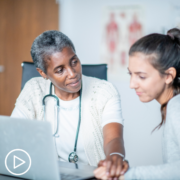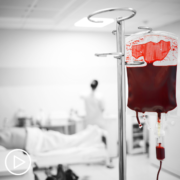Long-Term Effects Acute Myeloid Leukemia Patients Should Know
Long-Term Effects Acute Myeloid Leukemia Patients Should Know from Patient Empowerment Network on Vimeo.
What do acute myeloid leukemia (AML) need to know about potential long-term effects of treatment? Dr. Catherine Lai from Penn Medicine shares insight. Learn about medical considerations for monitoring and an activation tip to help patients ensure their optimal health for the long term.
[ACT]IVATION TIP from Dr. Lai: “Make sure that you’re reporting all your symptoms, however small that they may be at your appointment, so it can be discussed in asking if it might be related to a late effect, and then also asking if there is a survivorship clinic or a program that you can be a part of.”
Download Resource Guide en español
Related Resources:

What Are Some Clinical Predictors for Relapse in Acute Myeloid Leukemia? |

|

AML Clinical Trials Critical to Treatment Breakthroughs and Improvements |
Transcript:
Art:
Dr. Lai, I was diagnosed with lots more than 20 years after my transplant, and there are the long-term effects that AML patients should be aware of. What are some of those effects?
Dr. Catherine Lai:
Yeah, so that’s an extremely important question and one that is often, often overlooked, unfortunately, even just from a time constraint perspective, but I would say it depends on the type of chemotherapy and the type of transplant, whether it was myeloablative you received radiation before your transplant, but, in general, I mean things to consider or just think about, it’s a big work, and so about your heart, your lungs, your thyroid, your kidneys, and also age-appropriate cancer screening as all things that need to be taken into consideration as late effects, if you are able to…if you’re able to find a cancer center with a survivorship clinic, I think that that’s an extremely valuable resource, because not only are they able to address these medical issues, but they’re also able to address the psychosocial component as well, and just overall general well-being.
And so I think just being aware of the fact that there are late effects and the activation tip being, is that to make sure that you’re reporting all your symptoms, however small that they may be at your appointment, so it can be discussed in asking if it might be related to a late effect, and then also asking if there is a survivorship clinic or a program that you can be a part of.



